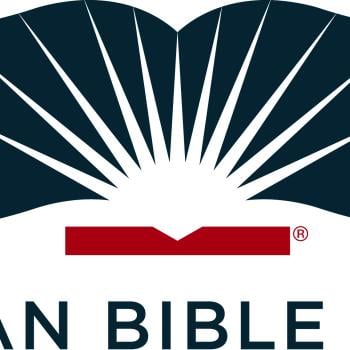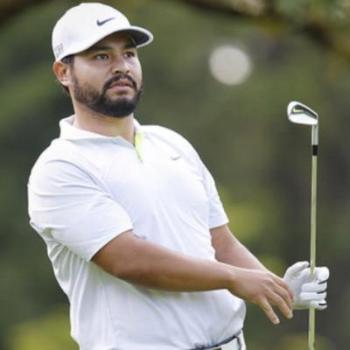Harvey Cox got his PhD in the history of religion and philosophy at Harvard University. Then he was a professor there until his retirement in 2009. As an ordained minister in the American Baptist church denomination, Harvey Cox is known as the foremost scholar in the world who advocates liberal Christianity.
I met Dr. Cox yesterday after I heard him speak at the Center for the Study of Religion and Conflict at Arizona State University in Tempe. Dr. Cox has authored fifteen books. He spoke on the subject of his most recent book, The Future of Faith (Harper One, 2009). That interested me due my writings on biblical eschatology.
Dr. Cox is a delightful fellow. I told him he looked and spoke like a dear friend of mine. He said, “Well, he must have been a handsome fellow.” Since Harvey writes on Pentecostalism, and he has a chapter on it in his new book, I showed him my new book on Pentecostalism entitled Solving the Samaritan Riddle (Wipf and Stock, 2015). He took the book, even had me sign it since he had just signed his book for me that I had just bought, and he said he’d have a look at my book.
Professor Harvey Cox’s speech yesterday was entitled “Five Changes Happening in Religions in the World Now.” I took notes as follows:
Dr. Cox began his remarks by cautioning, “Be careful about predicting the future.” He recounted that when he began his career fifty years ago, some of the world’s most intelligent historians and sociologists were predicting the near demise of religion throughout the world. He quoted some of them. One predicted that in the 21st century “there would only be small pockets of religious people scattered in the world.” Harvey said that instead, during these past fifty years, religion has had its largest gains in popularity in all of human history even though Christianity has declined much in Europe where it had flourished most throughout its history. He said communistic China may soon have more Christians than any other nation in the world. And he asserted that there is not a clash of civilizations going on between Islam and the West as many Islamic jihadists claim. Cox then spoke of five religious changes happening in the world now as follows:
- Movement of the Sacred into the Secular. Christianity during its first three centuries was faith-based and experience-based. It was a period Cox calls “the Age of Faith” in which Christians emphasized the teachings of Jesus and faith and the secular were intermingled. Christianity prospered by spreading its message into the world and thus being involved in secular life.
- Movement from Doctrine to Experience. Cox said religious doctrine is based on experience that must be interpreted. Even though he emphasized the need for religious experience, Cox said, “I do not advocate religion of the heart alone.” Then he said Christianity began to change from being experience-based to become doctrinal and creedal when Roman Emperor Constantine called for the Nicene Council in 325. Its 316 attending bishops then drafted the Nicene Creed. Cox calls the following period of about 1,500 years that extended mostly through the Middle Ages “the Age of Belief.” He says Christianity is now becoming more experience-based, thus returning to the Age of Faith. Cox also calls this transformation in post-modernity “the post-Constantine era.” He also calls the last fifty years or more “the Age of the Spirit” in which people are ignoring religious dogma and embracing spirituality.
- Movement from Hierarchy to Community. Cox says faith and community go together. He says people are not trusting religious authorities as they used to and are instead relying more upon their own religious experience and being transparent about it in community with other believers. He says people are realizing the value of being part of a real community of faith.
- Movement of Religions Influencing Each Other. Cox didn’t mention that the ad hoc History of Religions School in Germany, that existed from about 1880 to 1920, was known mostly for establishing the truth of this principle in history. Cox seems to imply it is happening more now than ever before.
- Movement from Patriarchy to Equality Between the Sexes. Cox told two stories that reflect this, which included the Episcopalian church ordaining a woman as a bishop.
Professor Cox then spoke on other religious issues going on now in our day. He mentioned that so many people in America are saying, “I’m spiritual, but not religious.” He further characterized their attitude in which they say, “We are in search mode. We are not atheistic, which it stupid. Just as you cannot prove that God exists, you cannot prove that God does not exist.” Cox also said the prolonged conflict between science and religion that emerged with Enlightenment is now past.
Harvey Cox spoke about the Roman Catholic Church’s new Pope Francis as “a very positive force for Christianity.” Cox met Pope Francis at the Vatican. The Pope took Harvey’s hand and said, “Please pray for me.” Harvey said he has been doing that ever since.
Cox said he himself is a supporter of Liberation Theology that has been prominent in Latin America and somewhat in the Roman Catholic Church there. Pope Francis has been also. Both men warn that the growing disparity between rich and poor in the world is destructive. And both exhort that true religion nurtures and defends the poor. Cox said Pope Francis signified this by taking his name from Saint Francis of Assisi. He was most known for aiding the poor and cultivating a relationship with Jesus.
Professor Cox wanted to end his talk on a positive note about the future of faith. So he said that if he could change the name of the institution that had hosted him that day at ASU, he would rename it The Center for the Study of Religion, Conflict, and Reconciliation.
(PS: One year on the PGA Tour during the 1970s I met an officer of the American Baptist Church who offered the denomination’s private, resort home at Greenlake, Wiconsin, for me and my family to stay at as a vacation during a summer week off the Tour. That’s where I had a prayerful, spiritual experience in which I became convinced that God was directing me to become an author of Christian books.)












